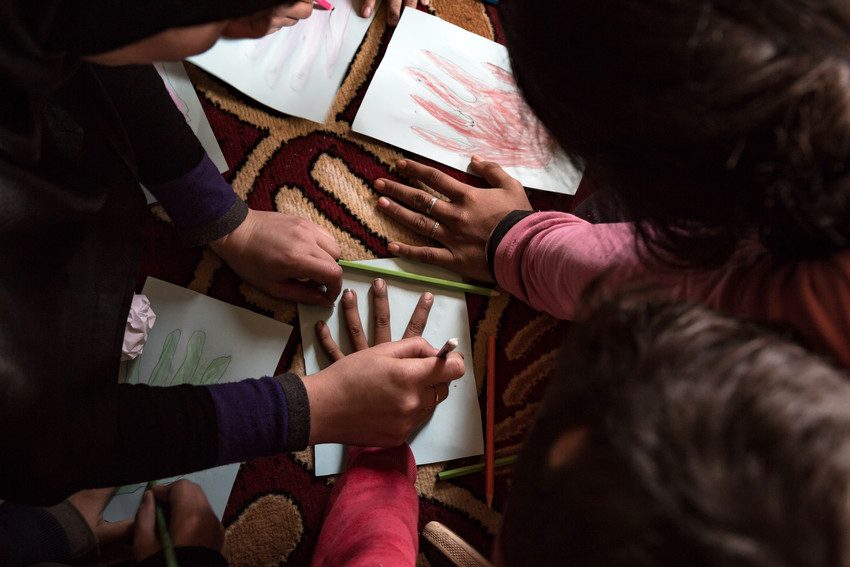Assessment: Ministerial meeting on the future of Syria and the region
3 June 2024Plan International assessment of the 8th edition of the Brussels conference on 'Supporting the future of Syria and the region', which took place on 27 May in Belgium.

Amal, 11, takes part in body integrity activity at Plan International's support centre. Lebanon. Credit: Plan International / Sima Diab.
The 8th edition of the Brussels conference on ‘Supporting the future of Syria and the region’ took place on Monday 27 May, bringing together EU Member States, Syria’s neighbouring countries, other partner countries and donors, and international organisations, including the UN. The Ministerial meeting followed the Day of Dialogue on 30 April, where civil society organisations, including Plan International, exchanged on key issues with the view of supporting those affected by the crisis.
A context of escalating needs
It has been 13 years since the crisis in Syria began, yet in a world preoccupied with emerging challenges, the Syrian conflict finds itself increasingly marginalised. Syrians face increased risks of malnutrition, health issues, lack of education, and protection concerns, as well as inadequate access to water, sanitation, and hygiene services. Violence remains widespread with severe effects on children’s safety and well-being. Approximately 7.2 million Syrians remain displaced, and over 2.5 million Syrian children are deprived of access to education. The humanitarian situation has worsened following the 2023 earthquake, one of the most severe natural disasters in the region this century, resulting in widespread displacement and exacerbating vulnerabilities, particularly among women and children.
In neighbouring Lebanon, the country has faced a cascade of complex crises since late 2019, including a severe economic collapse and the spill over of the Gaza crisis which has escalated tensions along the southern border areas. Lebanon hosts the largest number of refugees per capita globally and grapples with its worst multi-layered crisis in decades, fueling, in parts, a rise in anti-refugee rhetoric.
Jordan hosts over 1.3 million refugees, the vast majority Syrians. Resources and services in the country are strained, with more than half of refugees living in poverty and one-fifth experiencing food insecurity. Unemployment rates are notably high, affecting Jordanians and refugees alike. The nexus approach, integrating humanitarian and development efforts, is not yet clearly identified, leading to coordination challenges between government and humanitarian actors. There is a need for higher commitment to linking humanitarian and development components, and to the agenda of promoting the inclusion and self-reliance of Syrian refugees in Jordan.
Plan International recommendations to the EU
Reduced funding for the Syria crisis poses a dangerous and destabilising impact, as Plan International previously argued. This situation risks fostering the resurgence of terrorism, increasing hostility towards refugees, heightening conflicts, boosting displacement flows, renewing refugee movements within the region, and exacerbating migration abroad. To avoid these scenarios and to best support those affected, Plan International shared our recommendations ahead of the Brussels conference.
The list below is a summary. You can access the full brief and recommendations here.
- Demand a focused commitment from the global community to prevent the Syria crisis from being forgotten and ensure adequate funding to meet the escalating humanitarian needs.
- Funding should recognise the need of social cohesion programmes, demonstrating the mutual benefits for both communities, to promote inclusion and integration.
- Prioritise long-term economic support to host countries as part of a comprehensive response to the Syrian refugee crisis.
- Humanitarian response in Lebanon should not just focus on refugees, but on vulnerable persons (citizens or refugees), focusing on vulnerabilities rather than status, and with a particular focus on children.
- International actors must advocate for the recognition of the needs of Syrian refugees within host countries, such as their integrated access to education and livelihood opportunities.
- Reform coordination mechanisms to engage all levels of government, stakeholders, and humanitarian actors and explore opportunities to leverage development programming.
Outcomes of the Brussels conference
The Brussels conference received pledges of a total of €7.5 billion, out of which €5 billion is grants and €2.5 billion is loans. The EU pledged a total of €2.12 billion to support Syrians in Syria, as well as Syrians and host communities in neighbouring countries in Lebanon, Türkiye, Jordan and Iraq. The figure for the EU and EU Member States combined amounts to almost €6 billion.
Plan International welcomes these commitments and acknowledges that the EU and its Member States remain global leaders in humanitarian assistance, a much-needed role that is aligned with the increasing needs around the world and the interests of the EU in general. However, these commitments are not sufficient to meet the dramatic needs in Syria and in neighbouring countries. According to the United Nations Secretary General António Guterres “almost $9 billion is required to respond to this humanitarian disaster inside Syria and in the region, the United Nations’ largest appeal worldwide.” The funding gap will result in prolonged suffering and in the perpetuation of devastating realities for millions, including for children, girls and young women. The EU needs to exert its influence and work with other donors so that the international community decisively steps up its efforts to relieve suffering.
Moreover, the separation of the Day of Dialogue of civil society (30 April) and the Ministerial meeting (27 May), and the absence of leaders in the former, prevented any substantial interaction between Syrian and international civil society actors and decision-makers. Although civil society conclusions were communicated to the Ministerial meeting, the lack of direct engagement between humanitarians and donors represented a missed opportunity for genuine dialogue. Plan International strongly recommends that, in future meetings, organisers create inclusive, representative and meaningful spaces for true exchange.


